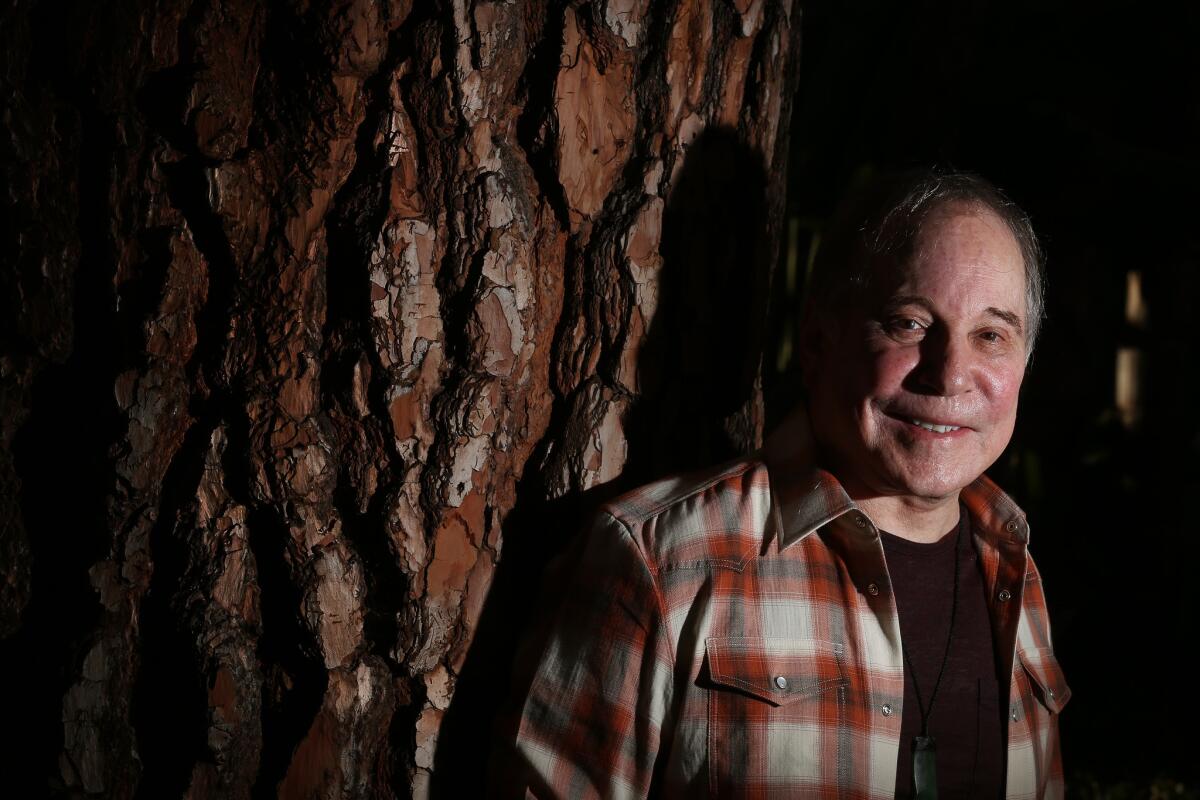Paul Simon on late-career peak with ‘Stranger to Stranger’ album

First things first: No, Paul Simon is not retiring.
That idea started zooming around the Internet last summer when a profile of the veteran singer, songwriter and 16-time Grammy Award winner quoted him as saying that show business “doesn’t hold any interest for me” and “I am going to see what happens if I let go.”
The logical conclusion might be that he was hanging up his guitar, but sitting in his hotel suite recently on a short stop in Los Angeles, Simon said it wasn’t what it might have sounded like.
“I’m never going to retire” from making music, he said definitively. “I might slow down and step away from the touring.”
See the most-read stories in Entertainment this hour »
At 75, Simon sounds eminently comfortable — though far from complacent — about his place in the pop music world.
“Because I have such a long history of writing, and people know my early songs so well, there’s really no chance that I’m going to write a new song that’s going to be up there like ‘Bridge Over Troubled Water,’ even if I wanted to — which I don’t — or even if I wanted to try.”
Simon’s interviews have been relatively rare nd far between in recent years, and he doesn’t suffer fools gladly or otherwise. He famously snapped at one reporter who asked whether he missed Art Garfunkel’s role in their songwriting partnership — the reporter apparently unaware that the singer wasn’t a co-writer. But this day, he is open, thoughtful, choosing words carefully, not in the sense of appearing overly cautious, but to elucidate each subject satisfactorily.
“One of the things people ask me all the time is ‘Why do you keep changing?’ ” he said. “It’s not like I wake up and say, ‘Well, what could I do now to change?’ I’m just tired of this, tired of that, interested in this, interested in that…. As long as you’re free from the constraint of trying to make a record that goes up on the charts, you can make great music.”
On the road again
The musician born Oct. 13, 1941, in Newark, N.J. and raised in Queens, N.Y, is returning to the road in support of his latest album, the critically acclaimed “Stranger to Stranger.”
It embodies his seemingly insatiable hunger for new sounds, melodies, lyrics, arrangements and instruments, a quest that’s been apparent almost since the beginning of a recording career dating back nearly 60 years, to his earliest efforts with Garfunkel, when they were a duo known as Tom & Jerry.
He was riding high as a solo act following the 1970 breakup with Garfunkel, scoring hits and Grammy Awards with seemingly equal ease. But after his 1983 album “Hearts and Bones” landed with a commercial thud, he rejuvenated his artistry and popular appeal by immersing himself in the rhythms of African pop music on “Graceland” in 1986, his third record to take home a Grammy for album of the year.
“Between the lines, his multicultural fusion reinforced the notion that music is a universal language that rises above politics,” states the Rock and Roll Hall of Fame’s entry on Simon. “He also helped open the mass audience’s ears to the marvelous forms of music that lay beyond their home borders. … Paul Simon deserves acclaim for making the world feel a little bit more like a community of kindred spirits.”
The glowing reviews that have largely greeted “Stranger to Stranger” — it scored an 85 (out of a possible 100) on Metacritic.com’s aggregate website, coupled with its entry onto the Billboard 200 Albums chart at No. 1 in its first week, has many music industry watchers predicting another album of the year nomination for Simon.
He’s modest about the accolades he’s collected over the years: the inaugural Gershwin Prize for Popular Music bestowed in 2007 by the Library of Congress to recognize “the profound and positive effect of popular music on the world’s culture”; induction into the Rock and Roll Hall of Fame — twice, as a member of Simon & Garfunkel and again for his solo career; induction into the national Songwriters Hall of Fame in 1982; and honorary doctorate degrees in music from Yale University and the Berklee College of Music.
But fundamentally, what he’s long sought through music, more than industry recognition, critical acclaim or fame, is creative satisfaction.

Truthfully, I know when I did something that’s original, and that’s really the most satisfying.”
— Paul Simon
“Truthfully, I know when I did something that’s original, and that’s really the most satisfying,” Simon said. “Beneath original is clever: ‘He’s very clever. That’s smart, that’s clever.’ … I’d rather be original, and not so smart or clever. But I’d rather be smart or clever than pretentious, and I’d rather be sentimental than pretentious, if I have to choose the sin.”
The pathway to originality, for Simon at least, involves a restless curiosity about the art and science of music, the ways the brain functions and the unsolvable mysteries of life.
“Songwriters will say sometimes, ‘I felt like I was just plugged in,’ or that ‘The song just came through me.’ That feeling, what you call flow, is very interesting,” he notes. . “What’s going on with serotonin, dopamine and adrenaline and how do you break down the components of flow when you’re in flow? Why does that happen and why can’t you reproduce whenever you want?”
“When I’ve asked friends of mine who are neuroscientists what’s going on, that’s what they say. But it’s not like you can say, ‘Give me those three components and I’ll knock off an opera for you.’ That keeps alive the idea of the mystery.”
Mystery, Simon said, is what keeps him and other artists forever challenged in their pursuits.
“When you say, ‘Here’s a scientific explanation,’ it takes the mystery, the God element, out. ‘It’s this and this and this, and then you get pleasure.’ You say, ‘It’s true, that happens when you get pleasure.’ But what is pleasure? Why is it that we are crazy for pleasure? You could say it’s these three chemicals, but no, we don’t know what that is. So the mystery is back.”
Over the last quarter century, Simon has sold nearly 7 million albums, according to Nielsen Music. His critically lauded 2011 album “So Beautiful or So What” has sold 375,000 copies; since it was released in June, “Stranger to Stranger” has racked up a total of 143,000.
“I don’t expect to connect in the way that I connected when I was writing hit after hit after hit,” Simon said.
Yet he found himself in front of one of the biggest audiences he’s played to in ages in July when he sang “Bridge Over Troubled Water” at the suggestion of his wife, singer-songwriter Edie Brickell, at the Democratic National Convention.

“Edie said, ‘Sing “Bridge Over Troubled Water,” that’s what the whole thing is about, trying to get people to come together.’ I was just trying not to be a Bernie [Sanders] sore loser guy, trying to say, ‘You better come together because you better win--you’ve got to win--otherwise, you’ve got a demagogue.’
“Generally speaking, I really do not like to do performances in political situations. I always think politicians use the artists and then they discard them after they get into office — never ask their opinions, never ask about issues… as if they have no bearing on anything...
“It’s not a smart thing for an entertainer to go out there and pick a candidate, because you alienate half the people, you know? I make my living entertaining everybody, so I don’t feel like alienating half the people. But I thought it was important to do, so I did.”
Otherwise, he said, “It’s a different connection now. I’m connecting with different people… I used to think it was a certain demographic, but it’s not. It’s just a way to thinking, or a way of listening or hearing.”
Ear for rhythms
“Stranger to Stranger” displays Simon’s ear for compelling rhythms and sonic effects, which he created this time around with exotic instruments crafted by musical experimentalist Harry Partch to perform the microtonal music he championed, plus world music touches such as the single-string Indian gopichand he plays on the opening track, “The Werewolf,” the robust tuba in “Cool Papa Bell,” the mbira, or South African thumb piano, used on different tracks and the bamboo marimba on “The Riverbank.”
“A lot of people don’t listen to lyrics first — they listen to sounds,” he recently told a Grammy Museum audience packing the 200-seat Clive Davis Theater to hear him in downtown L.A. “That’s the way I do it. If you want people to listen to you today, you better give them a good reason. It can’t just be good. It has to be more, there are so many choices — not just in music, in everything.”
As widely admired as he is by fans and respected by those in the music industry who have heaped award after award on him, he’s also faced detractors periodically.
After visiting South Africa to work on the “Graceland” album, he was pilloried for violating a cultural boycott of the country during the apartheid regime. Eventually, South African political prisoner-turned-president Nelson Mandela gave Simon, and “Graceland,” his blessing.
Simon also been criticized in some quarters for taking a songwriter credit for an arrangement of the British traditional folk tune “Scarborough Fair,” for not sharing writing credit with members of L.A.’s Latino roots rock band Los Lobos for the “Graceland” track “All Around the World or the Myth of Fingerprints” and of cultural imperialism with his sojourn to South America for 1990’s “The Rhythm of the Saints” album.
He dealt with that issue humorously on his recent Hollywood Bowl stop on the Stranger to Stranger tour. At one point in the show, guitarist Vincent Nguini, with his heavy Cameroonian accent, saluted the band’s leader for his travels “around the world exploiting various cultures.”
“Exploring,” Simon interjected. “Exploring.”
Ultimately, Simon says, it is history that will define the worth of his work, along with that of all other artists.
“The whole thing will be judged, if it’s judged at all, over time. It doesn’t have much to do with us really,” he said. “ ‘El Condor Pasa’ — 400 years old. That’s a hit! ‘Scarborough Fair’? That’s a hit. We just don’t know who wrote those.
“Some of the stuff I have is actually more than 50 years old now. If it lasts another 50 years, I think that’s the definition. If they’re still singing that song 100 years after it was written, that’s a good song.”
Follow @RandyLewis2 on Twitter.com
For Classic Rock coverage, join us on Facebook
ALSO:
In a ‘radical’ choice, Bob Dylan wins the Nobel Prize in literature
Roger Waters unveils plans for massive 2017 Us + Them tour of North America
It’s no Coachella, but this Joshua Tree festival may be the music model of the future
More to Read
The biggest entertainment stories
Get our big stories about Hollywood, film, television, music, arts, culture and more right in your inbox as soon as they publish.
You may occasionally receive promotional content from the Los Angeles Times.










